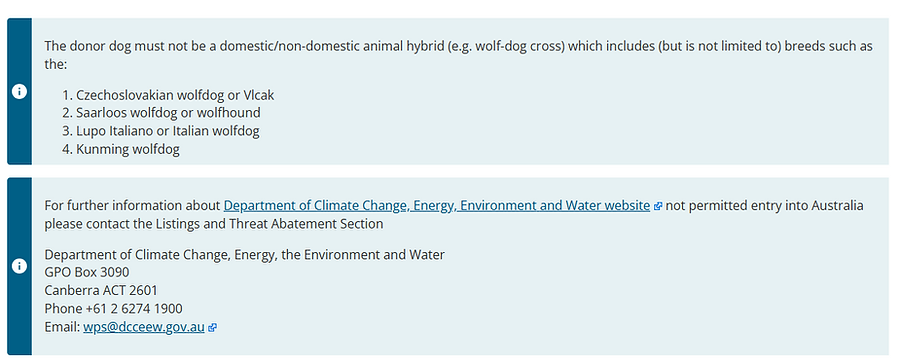
The Environment Protection and Biodiversity Conservation Act, 1999 (EPBC Act) is the Australian Government’s environmental legislation.
Since 2010, under the Environment Protection and Biodiversity Conservation Act, 1999, Australia has banned the importation of wolves/wolf hybrids and disallow breeds such as the Czechoslovakian Wolfdog (Czechoslovakian Vlcak), Saarloos (Saarloos Wolfhound), Lupo Italiano or Italian Wolfdog.
This also includes any dog that has wolf or wolfdog content such as the Tamaskan and Northern Inuit and many other "wolfalike" type breeds, who are not officially recognised by the world kennel club (Fédération Cynologique Internationale - FCI).
This also includes semen from a donor dog who has wolf content:

Reference: Australian Government, Department of Agriculture, Fisheries and Forestry, Australian Biosecurity Import Conditions and Food Safety Requirements (BICON)
Why aren't wolves and wolf-hybrids allowed in Australia?
Ecological & Biosecurity Risk
Australia has very strict controls on non-native species. The importation of wolves and wolf hybrids is prohibited because they are considered a high risk to native wildlife, to agriculture and to environmental balance.
Since Australia never had a true wolf species established in its ecology (though we do have wild canids like the Dingo). Introducing a wolf or wolf-dog hybrid could disrupt native ecosystems.
Import & Ownership Laws
Federal and state laws prohibit the import and keeping of wolves and wolf-dog hybrids.
For example:
-
The government lists wolves and wolf-dog hybrids as prohibited for pet ownership.
-
The ban on wolves extends to animals that have any wolf content or are wolf-dog hybrids.
Behavioural & Welfare Concerns
Wolves (and their hybrids) have behavioural, social, space and care needs that are very different from typical domestic dogs. Keeping them in a typical domestic situation raises serious risks to both human safety and to animal welfare.

Interestingly, there have been people who have deliberately broken Australian Law and illegally imported wolf content. Our club is not associated with these people.
As such, our club registered breeders do not contain any wolf content in their bloodlines whatsoever.
When submitting an application to import to the Department of Agriculture, Fisheries and Forestry, you must state the breed of your dog and sign a declaration stating that it is not a prohibited breed or hybrid. Fines up to $313,000 for individuals ($1,565,000 for corporations) and 10 years imprisonment can be imposed for providing misleading or false information on import declarations. Animals can also be seized and euthanised that have wolf content.
HISTORY
Our breed was founded in 2014 by Brooke Taylor, under the "Australian Lykos Development Project", which set forth a stud book, Breed Standard and Code of Ethics. The breeding program stated that they were to to be bred to look like wolves with a temperament suitable for Australian family homes. Only domesticated breeds such as the German/Swiss Shepherd, Alaskan Malamute and Siberian Husky and Samoyed were used as the early foundations.
As an owner and then breeder of purebred dogs since the year 2000, Brooke had had many conformation show and working successes with her bloodlines in Australia, but also on an international scale with her bloodlines being awarded under FCI judges and clubs.
Brooke envisioned a goal to develop Australia's first wolf-look-a-like breed here in Australia, using healthy dogs with exceptional temperaments, with unique wolfy colour and desired 'wolfy' phenotype. The intention was to develop dogs that would be fairly easy for Australian families, but also have the ability to excel in recreational dog sports.
Brooke derived the foundation bloodlines from her world-renowned purebred White Shepherd bloodlines, whose ancestors excelled in work as guides for the blind, therapy, service, search and rescue dogs, as well as many international working and show ring titles.
The founding dogs Oreo and Meira were selected due to their health results and exceptional temperaments which were intelligent, calm and laid back. They were hip and elbow x-rayed, cleared of MDR1 and DM (degenerative myelopathy) and their first litter was then born in April 2015.
This 2015 litter produced Lykosia Caesar, the Lykos who starred in the Volkswagen commercial as a wolf. The combination of Meira and Oreo produced some outstanding puppies, including an accredited assistance dog and a dog who did therapy work in an aged care home.
In 2018, once Embark DNA came on the scene, it measured the breed mix of the Meira x Oreo pups. The results came in as German Shepherd Dog from Meira, Alaskan Malamute, Husky and a very small % of Samoyed from Oreo's side.
Due to the success of the first litter in 2015, the combination was repeated again in December 2016.
More litters have been bred since this time to develop the breed, to which there are over 400 dogs registered within the stud book.
Several other breeders have registered with our organisation and continued with developing the Lykos Wolfalike since it's commencement.
A few former breeders have been removed from the LWCA due to code of ethics breaches, but Zioena (only one stud dog now) and Wolfden (retired) remain in good standing with the LWCA.

Oreo - foundation sire
Photo by Lykosia



